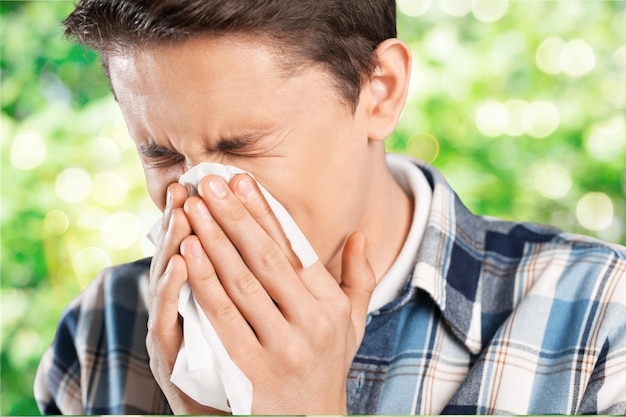

Persistent sneezing and itching can significantly impact your daily life, disrupting your sleep, focus, and overall well-being. This comprehensive guide explores the root causes of persistent sneezing and itching, focusing on understanding your allergy triggers. We’ll examine various types of allergies, discuss diagnostic methods, and explore effective management strategies. The article will cover different types of allergens, symptoms, and methods to alleviate discomfort. Lastly, it will delve into preventative measures to reduce the frequency and severity of allergy attacks and provide useful FAQs for readers.
Understanding the Underlying Causes of Persistent Sneezing and Itching
Persistent sneezing and itching often point to an underlying allergic reaction. Allergies occur when the immune system overreacts to a harmless substance, like pollen or dust mites. These substances, known as allergens, trigger the release of histamine and other inflammatory chemicals, leading to the characteristic symptoms of sneezing, itching, and nasal congestion. Understanding the types of allergies and potential triggers is the first step in finding effective solutions.
Different Types of Allergies
Numerous factors can contribute to persistent sneezing and itching. Seasonal allergies, triggered by pollen and other airborne particles, are common during specific times of the year. Food allergies, on the other hand, arise from particular foods that cause an immune response. Environmental allergies are often caused by indoor and outdoor allergens including dust mites, animal dander, mold, and certain chemicals.
Identifying the Allergens
Pinpointing the specific allergens is crucial for effective management. A thorough allergy assessment, including a detailed history, physical examination, and potential skin prick tests, can identify potential culprits. Environmental testing can further pinpoint the specific allergens causing the reactions, such as dust mites, mold spores, or pollen.
Diagnosing and Managing Persistent Sneezing and Itching
Proper diagnosis is essential for developing an effective management plan. A medical professional, such as an allergist, can conduct thorough testing to determine the specific triggers causing persistent sneezing and itching. Understanding the specific allergens will allow for a customized approach to treatment and avoidance strategies.
Allergy Testing and Diagnosis
Several diagnostic methods are available for identifying allergy triggers. Skin prick tests involve placing a small amount of potential allergen on the skin and observing the reaction. Blood tests can also measure the presence of antibodies specific to allergens. A physician can determine the most appropriate method based on the individual case.
Personalized Treatment Plans
Once the triggers are identified, a personalized treatment plan can be developed. This might include avoidance strategies to limit exposure to known allergens, medication to alleviate symptoms, and, in some cases, immunotherapy (allergy shots) to gradually desensitize the immune system to the allergens.
Alleviating Symptoms Through Effective Management Strategies
Effective management strategies can significantly reduce the impact of persistent sneezing and itching. This often involves a combination of avoidance, medication, and lifestyle adjustments.
Avoiding Allergens
Identifying and avoiding known allergens is a crucial component of symptom management. This could include minimizing exposure to pollen during peak seasons, keeping pets out of bedrooms, or using air purifiers to reduce indoor allergens. Properly cleaning and maintaining the home is also important.
Medications for Symptom Relief
Over-the-counter antihistamines, such as cetirizine or fexofenadine, can help reduce the symptoms of sneezing and itching. Decongestants can help clear nasal passages, while nasal corticosteroids can reduce inflammation and swelling. For severe cases, prescription medications may be necessary.
Lifestyle Adjustments for Prevention
Lifestyle adjustments play a significant role in preventing allergy flare-ups. By incorporating these changes, you can enhance your overall well-being.
Keeping Track of Symptoms
Maintaining a symptom diary can help track patterns and identify potential triggers. Pay close attention to when symptoms worsen and try to identify any common factors or environmental conditions that may be associated with these symptoms. This approach can be an essential step in the journey to finding relief.
Maintaining a Healthy Lifestyle
Regular exercise, a balanced diet, and adequate sleep are vital for a robust immune system. These crucial lifestyle choices can significantly impact how your body responds to allergens.
Exploring the Role of Environment in Persistent Sneezing
Environmental factors play a significant role in triggering allergic reactions. Recognizing these factors is crucial in preventing and managing persistent sneezing.
Indoor Environmental Factors
Indoor allergens like dust mites, pet dander, and mold spores can trigger persistent sneezing. Maintaining a clean and well-ventilated home environment can help reduce exposure to these allergens. Regular cleaning routines, proper ventilation, and using air purifiers can make a difference.
Outdoor Environmental Factors
Outdoor allergens like pollen, mold spores, and certain plants can contribute to allergic reactions. Taking steps like avoiding outdoor activities during peak pollen seasons or using an air filter can help reduce exposure.
Additional Tips for Allergy Management
Taking proactive steps can significantly improve your allergy management experience.
Importance of Allergy Testing
Allergy testing is vital in pinpointing the specific triggers, allowing for targeted interventions and symptom management.
Seeking Professional Advice
Consult with an allergist for personalized recommendations, including medication, avoidance strategies, and potential immunotherapy. An allergist can help develop a personalized plan for effectively managing persistent sneezing and itching.
Proactive Steps to Manage Symptoms
Taking proactive steps can prevent allergy attacks and improve your quality of life.
Monitoring Your Symptoms
Maintaining a detailed record of your symptoms, including when they occur and what you were doing at the time, can be helpful in identifying patterns and potential triggers.
Environmental Control
Minimizing exposure to allergens through environmental control strategies can minimize symptom severity. This might include using air purifiers, keeping the home clean, and using hypoallergenic products.
In conclusion, understanding persistent sneezing and itching is crucial for managing allergies effectively. Addressing the root causes, identifying triggers, and implementing proactive strategies can significantly improve your quality of life. Consulting with an allergist is essential for personalized recommendations and treatment plans. Don’t suffer in silence—take control of your allergy symptoms and learn to live more comfortably. Visit our website for more resources and to schedule a consultation today!